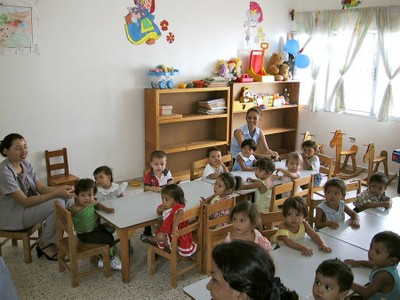SOS Social and Medical Centres in Honduras
In Honduras there are currently six Social Centres for children and the local community, including those in Choluteca and San Pedro Sula. Furthermore, there is one Medical Centre in Tegucigalpa. Many SOS Social Centres operate via Family Strengthening Programmes, which aim to support the wider community. Medical Centres provide medical treatments and services to the community. Below is some information about the Medical Centre and some of the Social Centres that SOS Children runs in Honduras:
SOS Medical Centre in Honduras
Tegucigalpa
Description of SOS Medical Centre:
The Medical Centre has rooms for medical treatment and physiotherapy, occupational therapy and relaxation has also been established. It is equipped with a swimming pool for hydro therapy. The adjoining SOS Youth Facility offers workshops for pottery, arts and crafts. A private hospital is near the SOS Children's Village, as well as two primary schools and a secondary school.
SOS Social Centres around Honduras: In-Depth
 Choluteca
Choluteca
Description of SOS Social Centre/FSP:
SOS Social Centre Choluteca is another facility on the site of SOS Children's Village Choluteca which developed out of the emergency relief programme. It includes a day-care centre where up to 150 babies and children can be looked after while their parents are at work. In addition, it has been running a childminding programme with mothers and families of the local community since 2005. Both programmes help to strengthen families and thereby prevent child abandonment.
Work and Achievements:
The Social Centre Choluteca has currently 11 community centres located in neighborhoods of the city of Choluteca (community centres with 516 children and social centre with 88 children with a total of 604 children).
Component Family: Family Development Plans (366 families) with 37 families representing 10% of the program, 26% of families have participated in training workshops for children (school of mothers and fathers), held a meeting of living with parents with the participation of 15 couples, representing 4% of the program.
Component Women: An average of 357 women during the year have participated in the program, 38% of women have received lectures on personal development, 85% of women use family planning methods, women who earn a minimum wage is 95 %, there is 8% of women in processes of literacy and educational leveling, 20% of women suffer from some diseases (diabetes, ulcers, high and low pressure, etc.).. These women are in medical care.
San Pedro Sula
Description of SOS Social Centre/FSP:
On the site of the SOS Children's Village, there is an SOS Social Centre including a day-care centre. This social centre also organises childminding programmes together with mothers and families of the local community
Work and Achievements:
in 2009, there were 8 community centres in operation, which had a population of 328 children and 154 families. Eighty-five (85) children completed the school year, 41 children also concluded FEREMA (a curriculum for early learning for children in preschool. Tw campaigns on environmental health were realised, hygiene and personal health, as well as an intense campaign (1) for one week on the prevention of transmission of influenza A H1N1, an issue that will continue until this year concludes.
They developed 9 training conferences aimed at mother educators, to improve boys’ or girls’ attention and in the various community centres, which included topics such as first, psychological first aid, resilience, group therapy, relaxation techniques, child development, social skills, development of training materials and human rights, development of 4 trainings where nutritionists joined at 8 centres in these training sessions addressed topics such as: simple ways to cook vegetables, make salads, and simple preparations of meat, also based on soy foods; coordinated with the Defense of a day of training children in the 8 community centres on boys and girls rights. It is worth mentioning that there has been a growing awareness, especially by educating mothers attending community centres in this topic. Other 6 trainings were aimed at mothers participating in the program, with the topics: hygiene for healthy living, training in self-esteem at home, contraception, importance of the Pap smear and breast exam, HIV prevention, family planning.

 Return to Schools Wikipedia Home page…
Return to Schools Wikipedia Home page…
